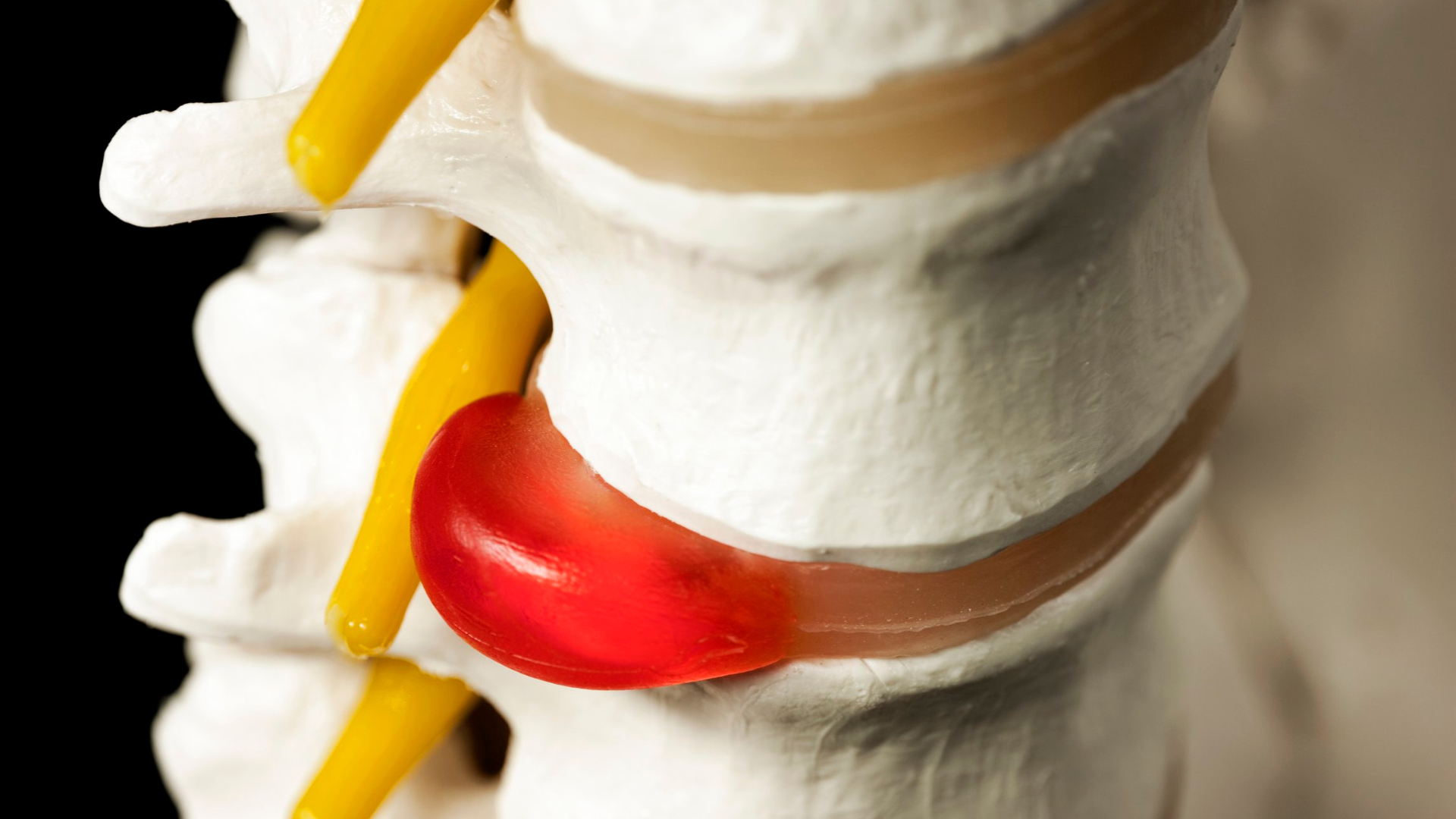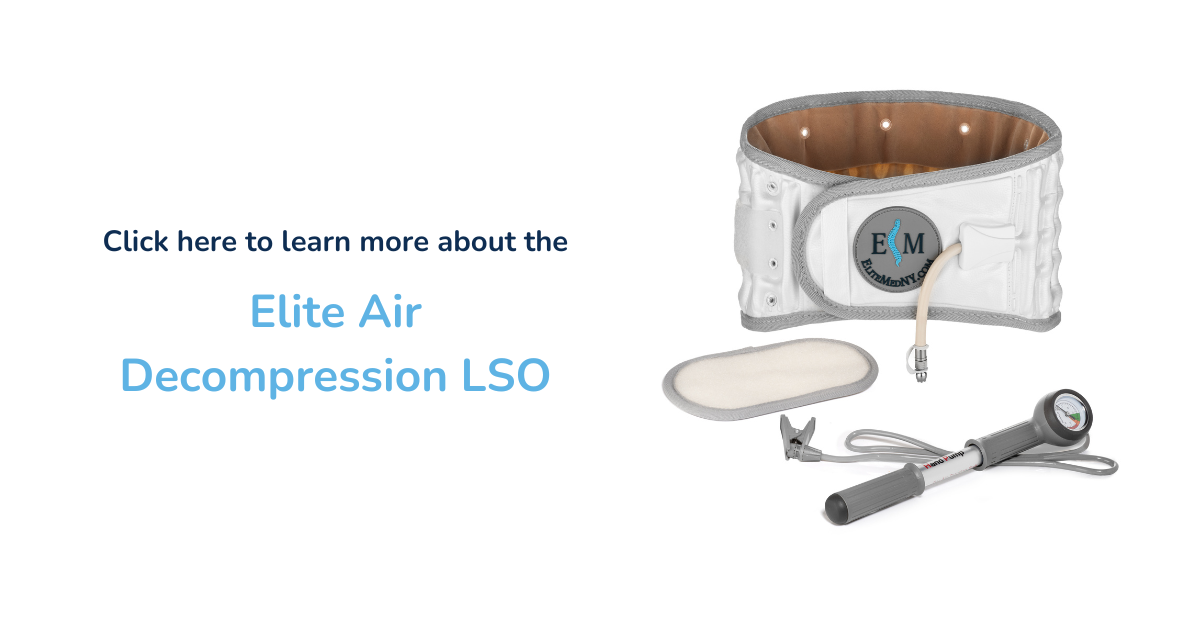Herniated Nucleus Pulposus
A herniated nucleus pulposus occurs when the hard outer shell of the vertebral disc ruptures and the nucleus pulposus prolapses. This condition is also referred to as a herniated or ruptured disc. The nucleus pulposus can become herniated in the cervical, thoracic, and lumbar regions of the spine.
The intervertebral disc is composed of a hard outer shell (annulus fibrosus) and a soft interior (nucleus pulposus). The nucleus pulposus is soft and flexible which allows for absorption of shocks and stress forces.

Example of nucleus pulposus extrusion
Causes
A herniated nucleus pulposus is often times the result of disc degeneration from age related mechanical stress. Other acute trauma or genetic conditions can also result in protrusion or extrusion of the nucleus pulposus from the annulus fibrosus.
Causes of herniated nucleus pulposus:
- Disc fractures
- Spinal injury
- Rheumatoid arthritis
- Spinal canal narrowing (injury, herniated disc)
- Degenerative disc disease
- Genetic predisposition
- Age-related degeneration
- Acute spinal injury
Symptoms
Symptoms can range from barely noticeable to acute pain. The severity of pain depends on if the nucleus pulposus has extruded from the hard outer shell and is putting pressure on adjacent nerves or spinal cord. This can be pronounced in the presence of a narrow spinal canal (spinal stenosis). You can learn more about spinal stenosis in the following articles:
Symptoms may include:
- Nerve pain which may radiate to extremities
- Numbness, tingling sensation
- Pain and discomfort
- Bowel or bladder disfunction
- Pain on one side of the body
Diagnosis
Your doctor will evaluate you to determine if symptoms of a herniated nucleus pulposus are present. Explain any symptoms you have been experiencing during your visit. This helpful guide provides information to help you effectively communicate at your next healthcare provider visit.
During the exam a variety of physical tests will be performed. Your doctor may order tests such as CT scans or a MRI to locate the cause and determine the severity. In some cases where a CT scan or MRI is inconclusive a nerve conduction study (NCS) or Electromyogram may be ordered.
Treatment
A variety of treatment options may be indicated for a herniated nucleus pulposus. Healthcare professionals such as physical therapists, specialists, and surgeons could be involved in your treatment plan.
Some conservative treatment options are:
- Physical therapy
- Stretching & low impact exercise
- Weight management and dietary changes
- Chiropractic care
- Acupuncture
- Non-steroidal, anti-inflammatory medication
- Epidural steroid injection
- Lumbar sacral orthosis (LSO) back brace and/or decompression LSO back brace
Surgery is typically a last resort but may be necessary to correct issues such as an spinal injury or a extrusion causing physical complications. A surgeon will consult with you if your symptoms are serious to determine the best course of action. If you are discussing surgery with your specialist this blog article has some useful information.
Invasive treatment options include:
- Microscopic discectomy
- Laminectomy
-
Laminoforaminotomy
-
Anterior Cervical Discectomy and Fusion
A thorough evaluation with your surgeon will determine which surgical intervention is right for your condition.
We're Here to Help
The team of experts at Elite Medical Supply is here to help identify the right brace for your condition. We offer a wide selection of LSO braces, SI (sacroiliac) braces, and a LSO decompression back brace to help alleviate the pain from disc herniation. Take a look at our selection of LSO braces by clicking here and selecting the LSO product type.
When you're ready to order a brace or need assistance making a choice we're here to help. You can reach us at 866-712-0881, send us an email, or fill out a contact form.
Written by Elite Medical Supply of NY
Braces and Products Covered by Medicare
Browse ProductsRecent Posts
- Cervical Brachial Syndrome (Thoracic Outlet Syndrome): What You Need to Know
- Spinal Decompression at Home: What It Is, How It Works, and Whether It’s Right for You
- Manage Osteoarthritis Progression With a Quality Knee Brace
- Product Highlight: Aspen Active™ P-TLSO
- Understanding Radiculopathy: Causes, Symptoms, & Treatment Options
Topics
- Back Braces (39)
- Knee Braces (31)
- Medicare Beneficiaries (31)
- Pain (25)
- Non-Opioid (23)
- Medical Providers (19)
- Lower back pain (11)
- Product Highlight (11)
- Sciatica (11)
- Muscle Spasms (10)
- Decompression (9)
- Lumbago (8)
- Degenerative disc disease (6)
- Lumbar Spinal Stenosis (6)
- Spinal Stenosis (6)
- Working with your doctor (6)
- Fracture healing (5)
- Herniated Nucleus Pulposus (5)
- Bulging or herniated disc (4)
- Neuromuscular Electrical Stimulation (NMES) (4)
- Quadratus Lumborum Syndrome (4)
- SI Joint (4)
- SI Joint Dysfunction (4)
- Spondylolysis (4)
- Wrist Pain (4)
- Bone Growth Stimulator Therapy (3)
- Bone Growth Stimulators (3)
- Carpal Tunnel Syndrome (3)
- Kyphosis (3)
- Supine Cervical Traction (3)
- Unicompartmental Osteoarthritis (OA) (3)
- Wrist Brace (3)
- wrist tendinitis (3)
- Ambulatory Cervical Traction (2)
- Braces for Golf (2)
- Cervical Traction (2)
- Electrical Stimulation (2)
- Failed Spinal Fusion Syndrome (2)
- Lumbar compression fractures (2)
- Radiculopathy (2)
- Spondylolisthesis (2)
- Total Knee Replacement (2)
- Wrist Braces (2)
- Arthritis (1)
- Braces for skiing (1)
- Cervical Brachial Syndrome (1)
- De Quervain Syndrome (1)
- Digital DME Orders (1)
- Knee Brace Accessory (1)
- Knee Suspension Wrap (1)
- Knee brace support for skiing (1)
- Medicare Scam (1)
- Muscle Atrophy (1)
- PCL (1)
- Patellofemoral Pain Syndrome (1)
- TLSO (1)
- Thoracic Outlet Syndrome (1)
- Ulnar Tendinitis (1)

